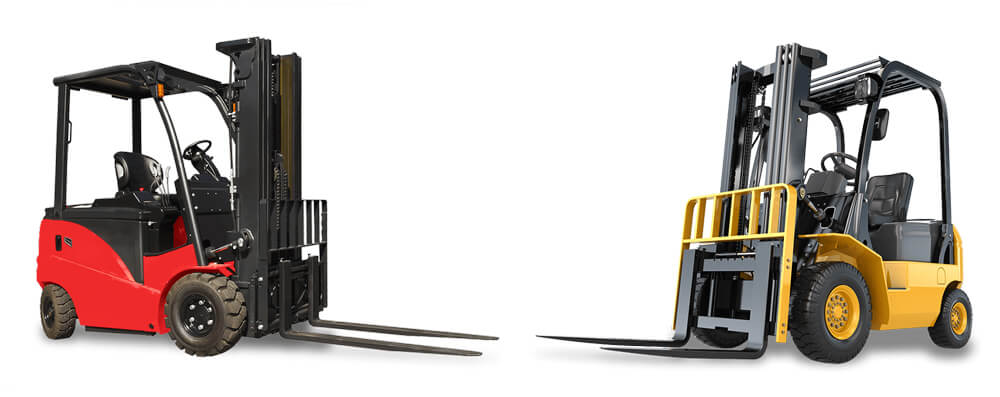The debate over electric forklifts vs. propane forklifts is had by every industrial business at some point.
Look at an electric and propane forklift from a distance, and they seem the same. For an expert, though, there are significant differences between the two.
Your choice of forklift ultimately depends on the demands required of your chosen machine. When comparing an electric forklift to a propane-powered forklift, here is what you need to consider.
Propane Forklifts
As you would expect from the name, propane gas forklifts use propane gas to power the engines on these machines.
Whenever the forklift runs out of fuel, it’s a matter of trading one pressurized propane tank for another. This can be performed quickly and without hassle.
How They Work
A propane engine works in much the same way as a gasoline engine, with the only real difference being the use of propane gas.
The gas is pushed into the engine, where it’s depressurized and converted into vapor. A throttle controls how much of this vapor is allowed to flow. The vapor mixes with the air upon spark plug ignition to create power.
Who Uses a Propane Forklift?
Propane emissions are minimal. As such, propane gas is considered to be a type of eco-friendly gas. This makes them suitable for use in warehouse environments. However, indoor environments must be well-ventilated.
The fact that propane tanks can be switched out means that a gas forklift is ideal for working remotely. When the forklift runs out of fuel, there’s no need to return it to the facility.
In addition, propane forklifts work a little faster than electric and can move a bit more weight.
Electric Forklifts
When making forklift comparisons, it’s not always the truck that can lift the most weight that wins the day. It all depends on the job.
Electric forklift trucks have several distinct advantages. For specific industries and work environments, going electric is the superior option.
How They Work
Propane forklifts, electric forklifts, and diesel-powered forklifts all operate similarly. However, an electric forklift operates with an electric motor.
A rechargeable industrial battery will typically power the electric motor. Alternatively, an external method of conveying power, such as wires or rails, can also be used.
Every truck is different, though, so you need the right power solution. Contact Texas Motive Solutions for expertt advice on the correct power source for your electric truck.
Who Uses Them?
Electric forklifts are better for indoor environments because there are no emissions; therefore, there’s no need to factor in ventilation needs.
The food industry uses electric forklifts exclusively. Food safety regulations mean manufacturers are unable to use forklifts that have any emissions.
Electric Forklift vs. Propane Forklift: Which is Best?
In the electric forklift vs. propane forklift debate, there is no undisputed winner. Both forklifts have their pros and cons.
Use Cases
An electric forklift, propane forklift, or even a gasoline-powered forklift will all excel in different areas.
For outdoor work spread over a large area, there is no better option than a propane forklift. On the other hand, if you work in a small space and close to a power source, an electric forklift is the superior option.
Propane forklifts also tend to be better in areas where work is ongoing throughout the day and night. Electric forklifts need to be charged for a few hours when they run out of power, whereas a propane forklift can just have its tank switched out.
Cost Analysis
A business must consider the initial and ongoing costs of maintaining a forklift fleet. This is where the argument over electric forklifts vs. propane starts to diverge as there are significant differences. Electric forklifts may cost more upfront but their lifetime value is typically more than that of a propane forklift. This is due to operation and maintenance costs.
Service Life
The general rule of thumb is that the average forklift will last for up to 10,000 pedal hours, approximately five years. The same goes for propane forklifts, so there is very little difference here.
Service life largely depends on good maintenance and the brand of forklift. For example, many businesses say Toyota forklifts can last for up to 20,000 pedal hours without repair.
Maintenance
Electric forklifts require less maintenance than propane forklifts. There are fewer parts that can break down, and propane forklifts tend to wear more on the brakes. Over time, maintenance costs will be higher on a propane forklift.
Cost of Propane vs. Electricity
There is no debate in this area. The cost of electricity is considerably lower than the price of regularly replacing propane tanks.
You may be asking, “why do forklifts run on propane at all?” The answer is because these forklifts are ideal for outdoor use and can run for longer periods of time.
Conclusion
Whatever forklift works best for your business, get the right power source at a cost-effective price through Texas Motive Solutions. Speak to our experts for insight into the best industrial power sources for your forklift fleet. Contact us today!



